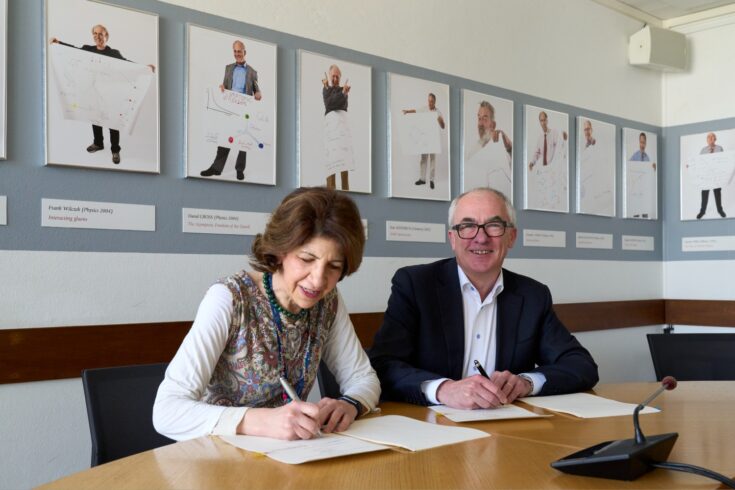STFC Executive Chair, Professor Mark Thomson and CERN Director General, Professor Fabiola Gianotti committed today to collaborate on the research and development of advanced new technologies.
The technologies will make future particle accelerators significantly more sustainable.
The agreement includes the proposed establishment by STFC of a new UK-based laboratory to host and support research and development in key technologies that will reduce the environmental impact of accelerators.
Reaffirming green commitments
Accelerator facilities such as STFC’s ISIS Neutron and Muon Source in Oxfordshire or CERN’s Large Hadron Collider are the primary tool that scientists use to study a very wide breadth of topics.
They help us understand a wide range of materials from new types of battery to the fundamental building blocks of the universe.
High speeds and energies
Accelerators operate by directing particles along a trajectory or path, typically circular or linear, at high speeds and energies, a process which demands significant energy input.
Accelerators produce beams of high energy subatomic particles for a wide variety of different applications.
The energy consumption of these machines can be significant.
Net zero by 2040
STFC has committed to reducing the energy demands of all its facilities as part of its commitment to ‘net zero’ by 2040.
Similarly, CERN has a stated aim of enhancing its efforts in sustainability by investigating new technologies with more responsible energy consumption and revising its purchasing policies.
Looking to the future
Importantly, both organisations are designing completely new accelerator-based projects.
STFC is taking the lead on the ISIS-II upgrade to its ISIS Neutron and Muon facility and CERN is leading on its Future Circular Collider.
These new projects have the ability to build sustainability in from the start, in all aspects of the facilities.
This is the key opportunity that STFC and CERN are signing up to today.
With this agreement, both organisations are better placed to pool resources and work together towards their common environmental goals for the benefit of the entire field.
Coming together for science
Mike Lamont, Director of Accelerators and Technology at CERN, said:
CERN is fully committed to fostering sustainability across its existing and forthcoming projects, actively engaging in a variety of initiatives.
These include sourcing renewable energy, implementing heat recovery schemes, and forging collaborations with industry to explore innovative applications of sustainable technology, such as high-power electricity distribution in various contexts.
Our philosophy in this regard aligns well with that of the STFC and we look forward for exploiting the potential of this collaboration – together we are stronger.
Building a strong foundation
The agreement will act as a framework to better direct STFC and CERN’s funding, expertise, and technological investment to minimise environmental impact.
It provides guidance and recommendations that consider the entire lifecycle of accelerator facilities from design and construction to operation and decommissioning.
These include establishment of new common projects and new channels to exchange information in the field of sustainability.
Making positive changes
Professor Mark Thomson, Executive Chair of STFC, said:
This agreement is an important step towards a more environmentally responsible future for the field of particle physics.
STFC and CERN are in a similar position as we look to the future of our accelerator facilities and it’s exciting to think about the strides we can make towards new, sustainable technologies.
The challenge of addressing the energy usage of accelerators is not insignificant, but there is no knowing what we can achieve when we bring together leading minds in particle physics from STFC, CERN, and around the world to tackle the problem head on.
A new green facility
The agreement also outlines a proposal for STFC to establish a new Centre of Excellence in Sustainable Accelerators (CESA) at the STFC Daresbury Laboratory in the Liverpool City Region.
CESA would conduct original research in sustainable accelerator technologies and train accelerator scientists, technicians and engineers in the skills required to develop new accelerators with the concept of sustainability at the heart of the design.
CESA would also work intimately with UK industry to ensure the seamless transfer of technologies and secure a long-term supply chain.
CESA is proposed to start operations between 2025 and 2026.

